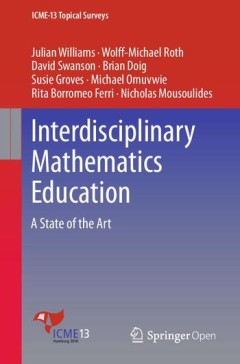Filter by

Traditions in German-speaking mathematics education research
This open access book shares revealing insights into the development of mathematics education research in Germany from 1976 (ICME 3 in Karlsruhe) to 2016 (ICME 13 in Hamburg). How did mathematics education research evolve in the course of these four decades? Which ideas and people were most influential, and how did German research interact with the international community? These questions are a…
- Edition
- -
- ISBN/ISSN
- 9783030110697
- Collation
- viii, 278p. : ill.
- Series Title
- -
- Call Number
- 370 JAH t

Drawing education : wordwide! : continuities - transfers - mixtures
As a cultural technique, drawing was firmly anchored in the realities of European society from early modern to modern times. Based on this fact, the present volume asks for the first time about the significance of drawing and drawing education in other cultural areas. Indigenous methods of drawing and sign-learning in Arabic, Asian, Latin American, North American and European countries are addr…
- Edition
- -
- ISBN/ISSN
- 9783947732302
- Collation
- vii, 323p. : ill.
- Series Title
- -
- Call Number
- 370 NAN d

Garden learning : a study on European botanic gardens' collaborative learning…
"From 2007-2013 the European 7th Framework Program Science in Society (FP7) funded a multitude of formal and informal educational institutions to join forces and engage in alternative ways to teach science—inside and outside the classroom—all over Europe. This book reports on one of these projects named INQUIRE which was developed and implemented to support 14 Botanic Gardens and Natural Hi…
- Edition
- -
- ISBN/ISSN
- 9781909188662
- Collation
- vi, 185p. : ill.
- Series Title
- -
- Call Number
- 370 KAP g

Modern mathematics education for engineering curricula in Europe : A comparat…
- Edition
- -
- ISBN/ISSN
- 9783319714165
- Collation
- VI, 182 p.
- Series Title
- -
- Call Number
- 370 MOD m
- Edition
- -
- ISBN/ISSN
- 9783319714165
- Collation
- VI, 182 p.
- Series Title
- -
- Call Number
- 370 MOD m

Interdisciplinary mathematics education : a state of the art
This book provides an essential introduction to the state-of the-art in interdisciplinary Mathematics Education. First, it begins with an outline of the field’s relevant historical, conceptual and theoretical backgrounds, what “discipline” means and how inter-, trans-, and meta-disciplinary activities can be understood. Relevant theoretical perspectives from Marx, Foucault and Vygotsky ar…
- Edition
- -
- ISBN/ISSN
- 9783319422671
- Collation
- vii, 36p. ill.
- Series Title
- -
- Call Number
- 510.71 WIL i

Collaboration in Designing a Pedagogical Approach in Information Literacy
This Open Access book combines expertise in information literacy with expertise in education and teaching to share tips and tricks for the development of good information literacy teaching and training in universities and libraries. It draws on research, knowledge and pedagogical practice from academia, to teach students how to sift through information to be able to distinguish the important an…
- Edition
- -
- ISBN/ISSN
- 9783030342586
- Collation
- xi, 161p.: ill.
- Series Title
- -
- Call Number
- 028.7071 lan c

Teaching in blended learning environments: Creating and sustaining communitie…
- Edition
- -
- ISBN/ISSN
- 9781927356487
- Collation
- x, 142p.: ill.
- Series Title
- Issues in distance education series
- Call Number
- 371.3 vau t
- Edition
- -
- ISBN/ISSN
- 9781927356487
- Collation
- x, 142p.: ill.
- Series Title
- Issues in distance education series
- Call Number
- 371.3 vau t
 Computer Science, Information & General Works
Computer Science, Information & General Works  Philosophy & Psychology
Philosophy & Psychology  Religion
Religion  Social Sciences
Social Sciences  Language
Language  Pure Science
Pure Science  Applied Sciences
Applied Sciences  Art & Recreation
Art & Recreation  Literature
Literature  History & Geography
History & Geography